Mobile apps play a crucial role in enhancing accessibility, user engagement, and efficiency in home energy audits. By offering features tailored to diverse user needs, such as voice commands and customizable interfaces, these applications ensure that everyone can participate in the auditing process. Additionally, they provide interactive tools and real-time data to help homeowners better understand their energy usage, ultimately leading to improved energy efficiency and savings.
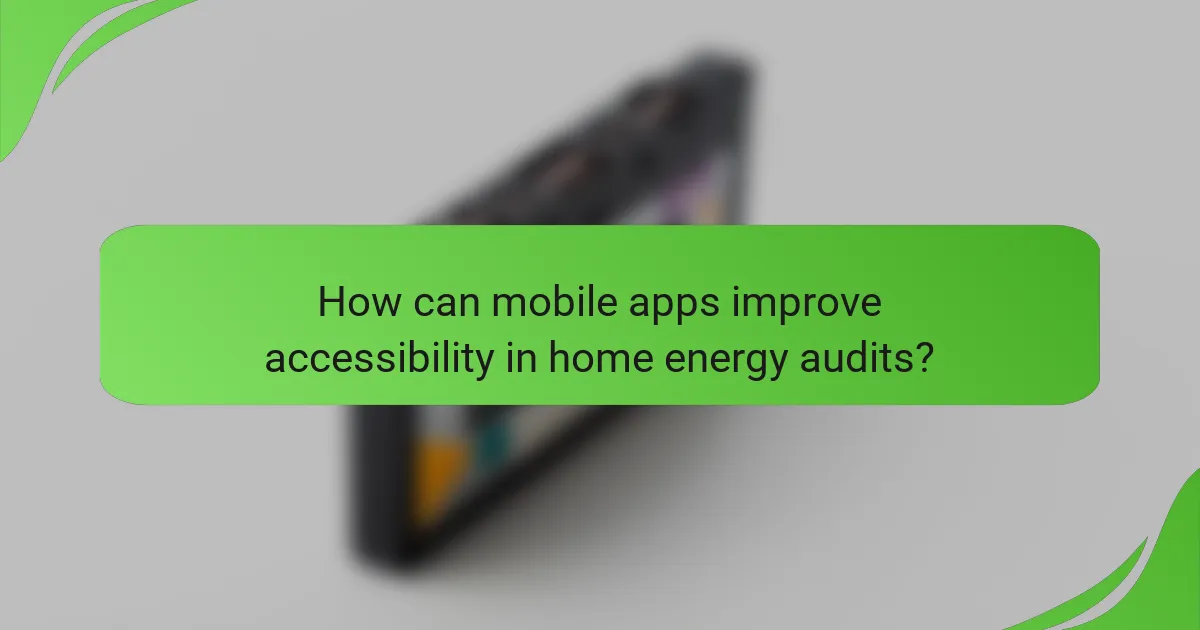
How can mobile apps improve accessibility in home energy audits?
Mobile apps enhance accessibility in home energy audits by providing tools that cater to diverse user needs, ensuring everyone can participate in the process. Features like voice commands, screen reader compatibility, and customizable interfaces make it easier for individuals with varying abilities to engage with energy audit tasks.
Voice command features
Voice command features allow users to interact with mobile apps hands-free, making it particularly beneficial for those with mobility impairments. Users can issue commands to navigate the app, input data, or receive information about energy efficiency without needing to physically manipulate the device.
For effective voice command functionality, apps should support natural language processing to understand a variety of user requests. This can include asking for tips on energy-saving measures or requesting a summary of audit results, enhancing user engagement and efficiency.
Screen reader compatibility
Screen reader compatibility is crucial for visually impaired users, enabling them to receive auditory feedback from the app. This feature reads aloud text displayed on the screen, including instructions, data inputs, and results from the energy audit, ensuring that all users can access the information they need.
When developing apps, it’s essential to follow accessibility guidelines such as the Web Content Accessibility Guidelines (WCAG). This includes using proper labeling for buttons and fields, which helps screen readers convey information accurately to users.
Customizable user interfaces
Customizable user interfaces allow users to adjust the app’s layout and features according to their preferences and needs. This can include changing font sizes, color contrasts, or rearranging elements to enhance usability for individuals with specific accessibility requirements.
Offering a range of customization options can significantly improve user satisfaction and engagement. For instance, users may prefer a simplified view that focuses on essential data during an energy audit, reducing cognitive load and facilitating better decision-making.

What are the best mobile apps for user engagement in home energy audits?
The best mobile apps for user engagement in home energy audits enhance the auditing process by providing interactive features, real-time data, and user-friendly interfaces. These applications help homeowners understand their energy usage and identify areas for improvement, ultimately leading to energy savings and increased efficiency.
EnergyHub
EnergyHub is a comprehensive platform that connects various smart devices to monitor and manage energy consumption. Users can track their energy usage in real-time, set energy-saving goals, and receive personalized recommendations based on their habits.
This app supports integration with numerous smart home devices, allowing users to control thermostats, lights, and appliances from one interface. It also provides insights into energy costs, helping users make informed decisions about their energy consumption.
Sense
Sense focuses on providing detailed insights into home energy usage by analyzing the electrical signals in a home’s wiring. This app can identify individual devices and track their energy consumption, giving users a clear picture of where their energy is going.
With its user-friendly interface, Sense allows homeowners to set alerts for unusual energy spikes and provides historical data to help identify trends. This can lead to actionable insights that encourage energy-saving behaviors and improve overall efficiency.
Home Energy Saver
The Home Energy Saver app is designed to help users conduct energy audits and receive tailored recommendations for energy efficiency improvements. It guides users through a series of questions about their home and energy usage, producing a customized report with potential savings.
This app is particularly useful for homeowners looking to make informed decisions about upgrades and retrofits. It includes a variety of resources, such as cost estimates and links to local incentives, making it easier to take action on energy-saving opportunities.
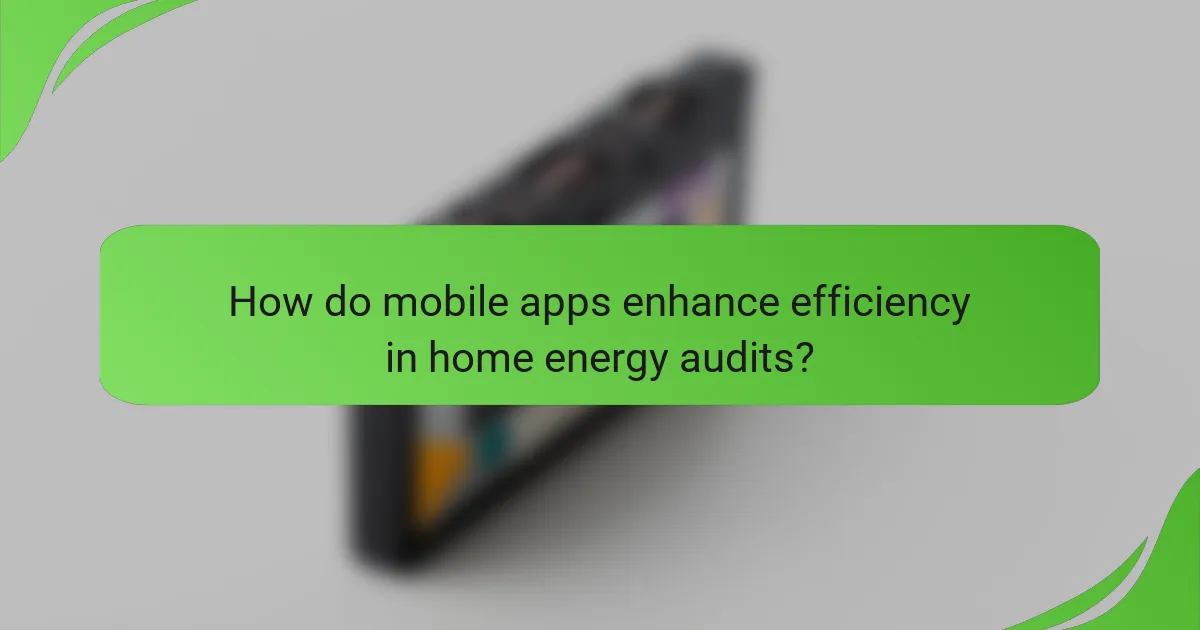
How do mobile apps enhance efficiency in home energy audits?
Mobile apps significantly enhance efficiency in home energy audits by streamlining data collection, automating reporting, and integrating with smart home devices. These features not only save time but also improve the accuracy and effectiveness of energy assessments.
Real-time data collection
Real-time data collection allows auditors to gather information instantly during the energy audit process. Mobile apps can utilize device sensors to measure temperature, humidity, and energy consumption without manual input, leading to more accurate assessments.
For example, an app can track energy usage patterns over a week, providing insights into peak consumption times. This immediate feedback helps homeowners identify areas for improvement more effectively than traditional methods.
Automated reporting
Automated reporting simplifies the documentation process by generating detailed reports based on the collected data. Mobile apps can compile findings into user-friendly formats, such as PDFs or spreadsheets, which can be easily shared with homeowners.
This feature saves auditors hours of manual work and reduces the risk of errors in reporting. Homeowners receive clear recommendations and actionable steps, making it easier to implement energy-saving measures.
Integration with smart home devices
Integration with smart home devices enhances the audit process by providing additional data points and control options. Mobile apps can connect with devices like smart thermostats, lighting systems, and energy monitors to gather comprehensive energy usage information.
This connectivity allows for real-time adjustments during the audit, enabling auditors to demonstrate potential savings directly. Homeowners can see how changes in settings impact energy consumption, fostering a better understanding of their energy use and encouraging proactive management.
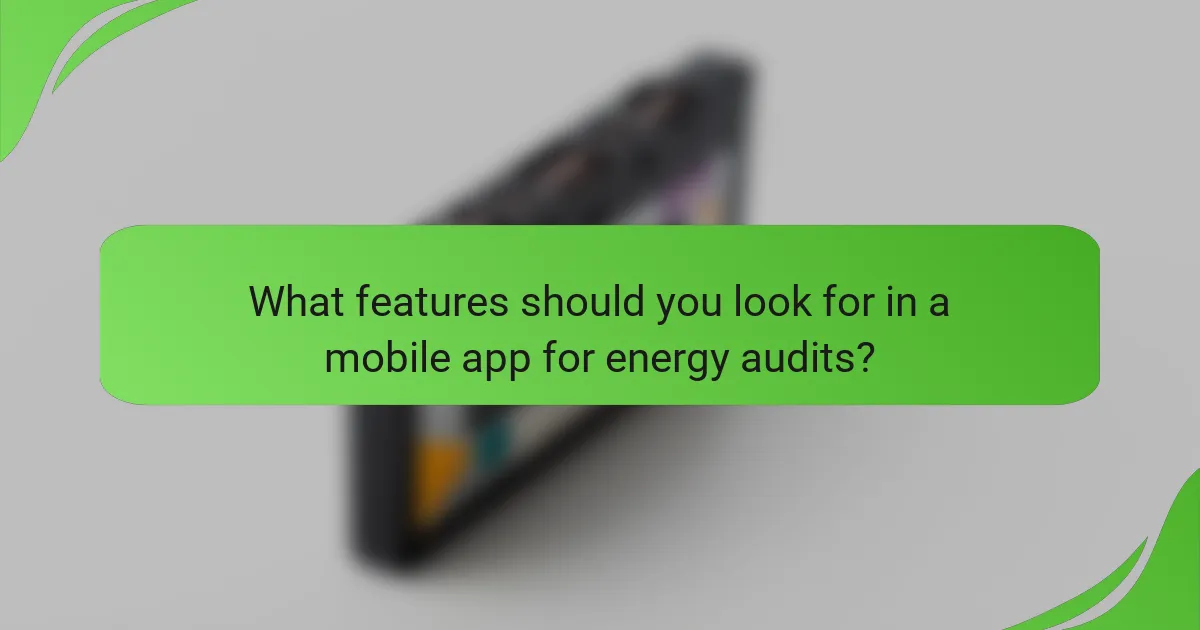
What features should you look for in a mobile app for energy audits?
When selecting a mobile app for energy audits, prioritize user-friendly design, effective data visualization tools, and offline functionality. These features enhance the overall user experience and ensure accurate assessments of energy efficiency in homes.
User-friendly design
A user-friendly design is crucial for ensuring that users can navigate the app easily and efficiently. Look for intuitive layouts, clear icons, and straightforward navigation paths that minimize confusion. Features like customizable dashboards can help users focus on the most relevant data for their specific needs.
Consider apps that offer guided workflows or tutorials to assist users in completing energy audits. This can be particularly beneficial for those who may not be familiar with energy efficiency concepts or technical jargon.
Data visualization tools
Data visualization tools are essential for interpreting the results of energy audits effectively. Look for apps that provide charts, graphs, and other visual aids to represent energy consumption patterns and potential savings clearly. This can help users quickly identify areas for improvement.
Effective visualization can also include comparisons to benchmarks or averages, allowing users to see how their energy usage stacks up against similar homes. This contextual information can motivate users to take action on energy efficiency improvements.
Offline functionality
Offline functionality is vital for conducting energy audits in areas with limited internet connectivity. Ensure the app allows users to download necessary data and access features without needing a constant online connection. This is particularly important for fieldwork where Wi-Fi may not be available.
Additionally, consider apps that automatically sync data once a connection is restored. This ensures that all findings are saved and accessible, providing a seamless experience for users who may be working in remote locations.
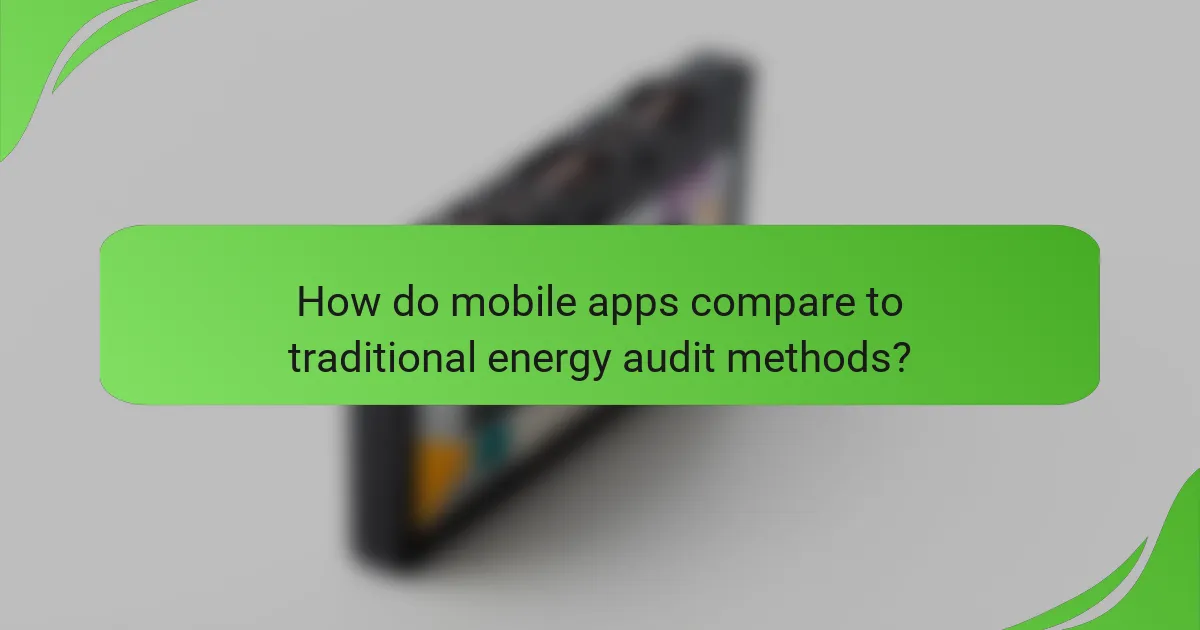
How do mobile apps compare to traditional energy audit methods?
Mobile apps offer a more streamlined and efficient approach to energy audits compared to traditional methods. They enhance accessibility, reduce costs, and improve user engagement, making the audit process quicker and more effective.
Cost-effectiveness
Mobile apps significantly lower the costs associated with energy audits. Traditional audits often require professional services that can range from hundreds to thousands of dollars, while apps can provide similar insights for a fraction of that cost, often under $100.
Additionally, many mobile apps are free or available for a small one-time fee, making them accessible to a wider audience. This affordability allows homeowners and small businesses to conduct regular audits without breaking the bank.
Speed of analysis
The speed of analysis with mobile apps is a major advantage over traditional methods. While a conventional audit can take several hours to complete, mobile apps can often deliver results in just a few minutes. Users can quickly input data and receive immediate feedback on their energy usage.
This rapid analysis allows homeowners to make timely decisions about energy efficiency improvements, potentially leading to immediate cost savings on utility bills. The quick turnaround can also facilitate more frequent audits, helping users stay on top of their energy consumption.
User engagement levels
Mobile apps enhance user engagement through interactive features and user-friendly interfaces. Unlike traditional audits, which can feel daunting, apps often gamify the process, encouraging users to participate actively in their energy management.
Features such as progress tracking, personalized recommendations, and educational resources keep users motivated and informed. This increased engagement not only helps users understand their energy consumption better but also fosters a sense of responsibility towards energy efficiency.
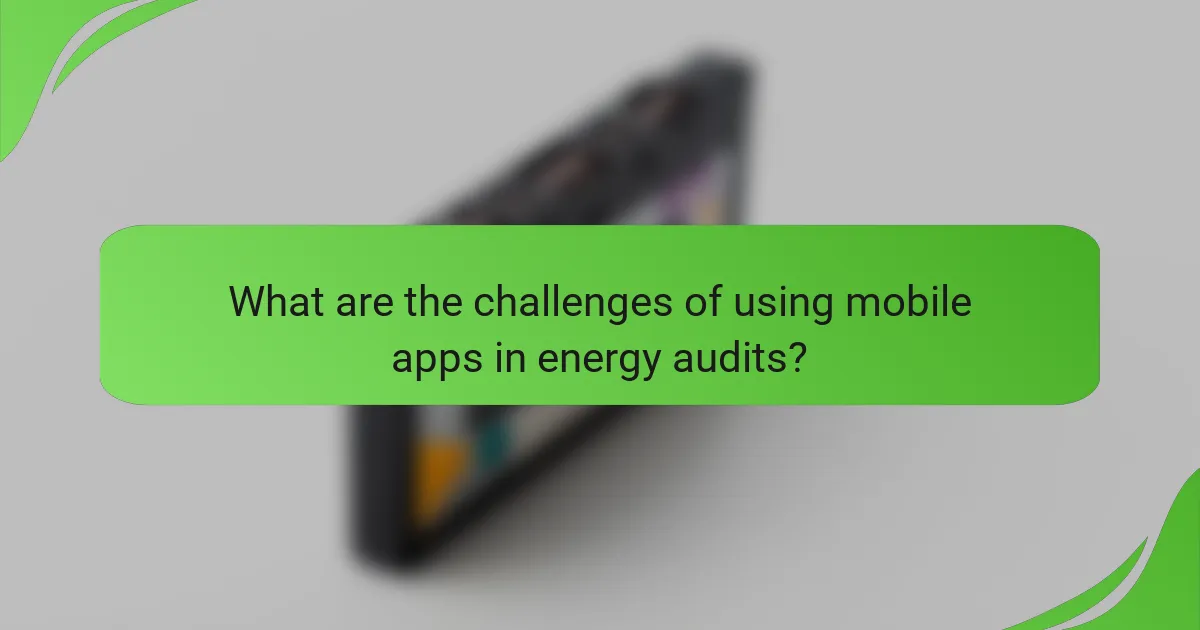
What are the challenges of using mobile apps in energy audits?
Mobile apps in energy audits face several challenges, including data privacy concerns, user engagement issues, and the need for efficient data collection. These factors can significantly impact the effectiveness and reliability of energy audits conducted via mobile platforms.
Data privacy concerns
Data privacy is a critical challenge when using mobile apps for energy audits. Users often share sensitive information about their homes and energy usage, which can be vulnerable to breaches if not properly secured. Ensuring compliance with regulations like the General Data Protection Regulation (GDPR) in Europe or the California Consumer Privacy Act (CCPA) in the U.S. is essential for maintaining user trust.
To address these concerns, app developers should implement strong encryption methods and transparent data usage policies. Users should be informed about what data is collected, how it will be used, and who it will be shared with. Regular audits and updates to privacy policies can help mitigate risks and enhance user confidence.
Additionally, offering users control over their data, such as the ability to delete their information or opt-out of data sharing, can further alleviate privacy concerns. This not only builds trust but also encourages higher engagement with the app, leading to more accurate energy audits.
